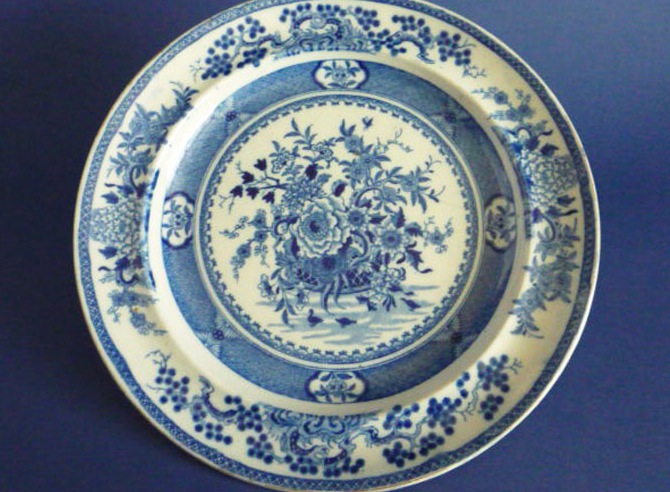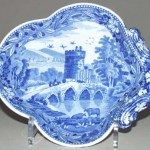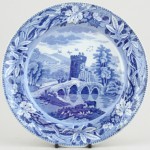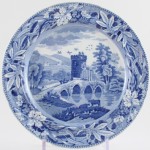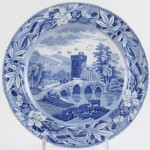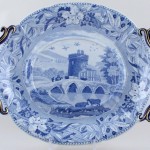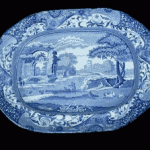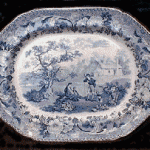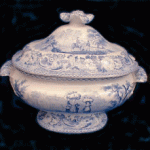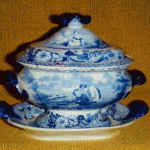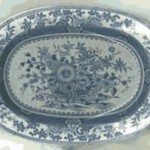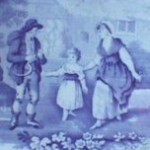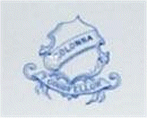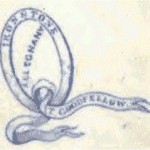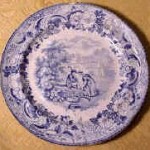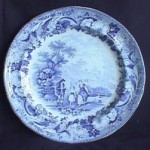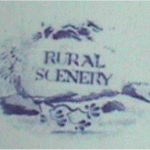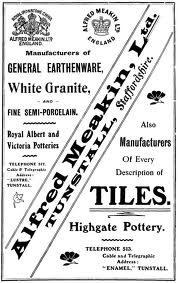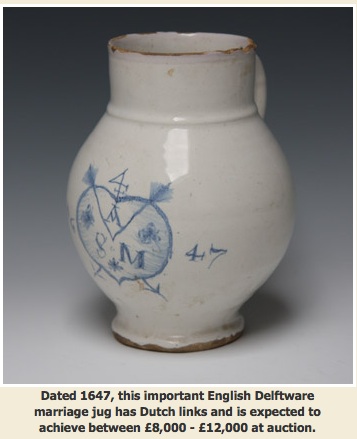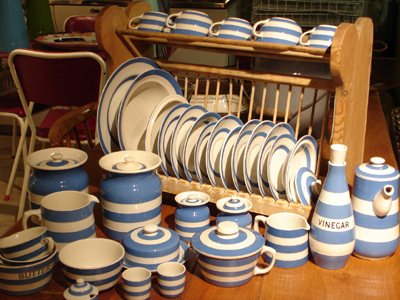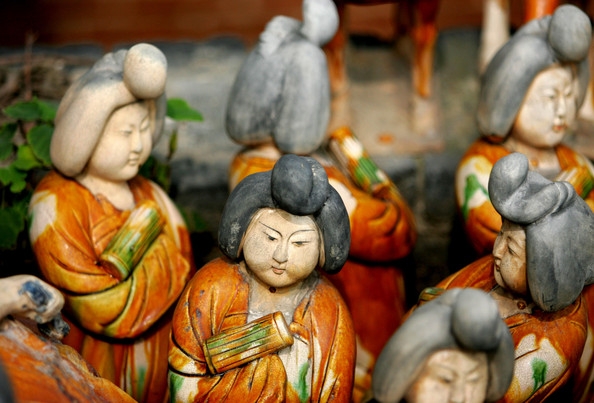Manufacturers of decorative earthenware at Burslem and Tunstall
NOTE: This firm is sometimes referred to as BOTHWELL & GOODFELLOW (in error)
c. 1818-1823
The three pottery businesses of Thomas Goodfellow I & II are seldom mentioned except as reference. Most likely because little has ever been known or printed about these businesses, that operated for over seventy years, producing many fine examples of transfer and flow blue wares.
THE THOMAS GOODFELLOW’S
THOMAS GOODFELLOW I [1763-1829]
Thomas Goodfellow I was born in 1763, one of seven children and son of Samuel & Elizabeth. Thomas became a partner with William Rhead, of Rhead & Goodfellow, at the Overhouse pottery in Burslem in 1827. The pottery was leased from Thomas Wedgwood and situated in Wedgwood Place, close to the town centre. There appears to be no known trade or identifying mark for this partnership at present. In 1812 Rhead & Goodfellow are known to have been operating from the Phoenix Pottery in Tunstall. This relocation was due to Thomas Wedgwood wishing to sell the Overhouse pottery.
Enoch Booth & his son-in-law an Anthony Keeling, one of the eminent potters of the day were wishing to vacate the Tunstall pottery due to financial difficulties. This pottery having been noted earlier, as being the place where a Captain Winter claimed to have made the only ‘true’ porcelain, in Staffordshire. The pottery stood north of tower square & west of high street. Keeling had built a large house by the works in 1793 named Calver House & both of the Goodfellow’s lived there.
William Rhead passed away in 1816 and left his part of the co-partnership to his brother-in-law, William Bathwell, creating the partnership of Bathwell & Goodfellow in October 1817. William Bathwell was a master potter from the partnership of Riles & Bathwell, documented by W.H.Little in his book ‘Staffordshire Blue’.
Bathwell & Goodfellow produced mainly ‘blue & white’ earthenware, with the impressed words of Bathwell & Goodfellow and there is no reason to doubt that it had been in production during the years before, since 1787. Tableware often displayed many interesting scenes with the Rural Scenery being the most famous, with the pottery cartouche on the underside of the ware. Many of the other patterns have become confused with Minton and Spode tableware. The partnership is often incorrectly reported as Bothwell & Goodfellow. Due to ill health in the Bathwell family the partnership was only short term, William Bathwell passing away in 1824. Thomas Goodfellow I passed away at Calver House in 1829, leaving his wife Francis, young son Thomas aged 27 and two young daughters Sarah & Elizabeth.
| Rhead & Goodfellow | 1787-1812 Overhouse Pottery, Burslem |
| William Rhead & Thomas Goodfellow I | |
| Trademark R & G | |
| Bathwell & Goodfellow | 1812-1823 Pheonix Pottery, Tunstall |
| William Bathwell & Thomas Goodfellow I | |
| Trademark Bathwell & Goodfellow | |
| Thomas Goodfellow | 1823-1859 Pheonix Pottery, Tunstall |
| Thomas Goodfellow II | |
| Trademark T.Goodfellow & cartouche |
Thomas Goodfellow II took over from his father at the Pheonix pottery. Thomas married an Ann Heath, daughter of Joseph Heath a fellow earthenware manufacturer in Tunstall. They had one daughter, Fanny, born 1840. Ann Heath died at the young age of twenty-five from a badly diseased liver. Leaving Thomas to take care of his daughter. Census returns reveal that Thomas had to employ help to look after his young daughter in 1841 & 1851. However like many of the pottery owners he moved away from the smoke and grime to a delightful home at Balterley in the countryside. An elegant large half timbered house on elevated ground called ‘Hall of the Wood’, locally Hall O Wood.
In 1833 the pottery had been reported as having, two hundred workers and seven pottery ovens. The pottery was described eight years later as ‘dirty, sloppy, ill-ventilated and inconvenient.
The wares from the pottery were often impressed with ‘T.Goodfellow’ or printed with the name of the design, within a cartouche. Known mould patterns were Erie, Paxton, Albany, Canton, Acantha or Acanthus, Bath, Coburg, Imperial & Saxon. Copper plate names being Willow, Wild Rose, Singan, Indian, Lucern, Bridge of Lucarno, Chaplet, Colonna, Moselle, Rhone, Polish Star, Arcade, Basket, Grecian Temple or Palladian, Tyrian, Formosa, Marina, Broseley, Royal Persian, Alleghany and the Rural Scenery series.
Wares such as decorative dishes and plates, sometimes with pierced or woven sides.
A recent discovery was a reference in the Staffordshire Advertiser 25th October 1862 in which one-hundred and seventy-eight crates of earthenware bound for the U.S. made by Thomas Goodfellow, were offered for sale. These crates had been lying at Runcorn, England for four years since the death of Thomas Goodfellow.
What happened to them?
The Thomas Goodfellow’s of Burslem & Tunstall will be in time become a name that is more common to the antique world and historians. Research is always uncovering unknown facts. If one can believe what the son of Fanny Goodfellow, a Charles Hose, wrote in his book ‘Romance & Research or A Jungle Wallah At Large’ [1927] pg. 19,
“My dear mother, who as I revise these pages for press has only just passed away at the age of eighty-seven years, came from a fine old Staffordshire family, being the daughter of Thomas Goodfellow of ‘Hall O Wood’, who with his father, Thomas Goodfellow senior, owned famous pottery works at Tunstall. They are perhaps best known for the fact that it was they who introduced the famous willow pattern into England, having brought Chinese potters to England to teach their employees these designs.”
Facts are known that the Pheonix pottery was making the famous willow pattern prior to 1858, there are many fine examples left with us showing that the quality of workmanship was superior to other manufacturers of the time. There is the listing of the copper plates and moulds stated in the will of Thomas Goodfellow. The question arises as to who bought the plates and moulds ? Minton ? Spode ? For as we read all to often it was they whom developed the willow pattern. Are we sure that is correct ?

